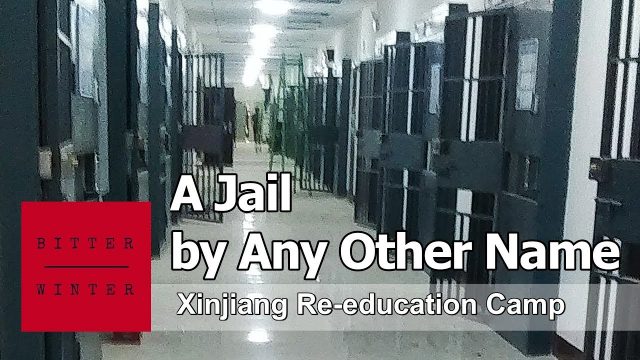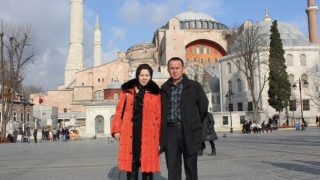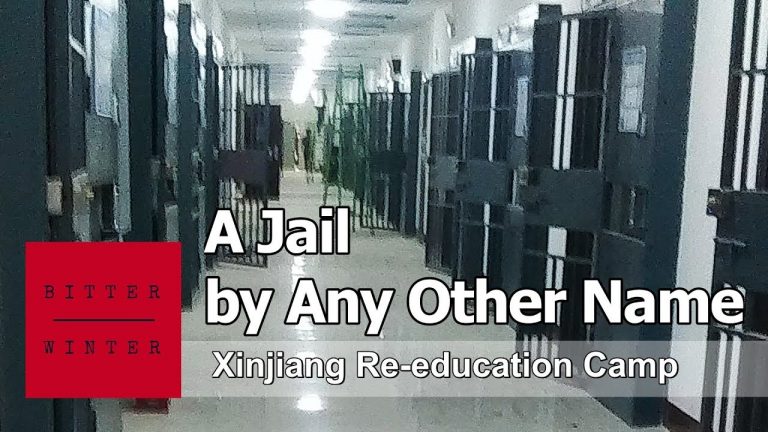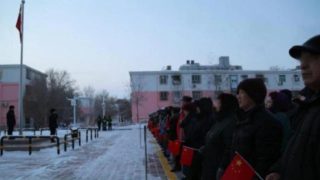
The Uyghur Human Rights Project reveals new details on Beijing’s massive campaign to persuade the world that there is no persecution in Xinjiang.
by Ruth Ingram
Propaganda exposed
Disappearing Uyghur graveyards, magically re-appearing; loved ones assumed dead in the camps paraded on world television with not a care in the world; and penniless villagers hailed reborn as entrepreneurs and factory bosses: the Chinese State propaganda apparatus has been working overtime to convince the international community of its philanthropic intentions towards the Uyghurs.
Beijing’s stepped-up fake news campaign to whitewash the scandal of abuse taking place in Xinjiang has been exposed in the Uyghur Human Rights Project latest report released this week, entitled “The Happiest Muslims in the World”: Disinformation, Propaganda, and the Uyghur Crisis.
From initial outright denial of the existence of transformation through education camps, the report traces the rise of Chinese engagement since 2017 with both national and world opinion, as the extent of human rights abuses is unveiled. The report records the masterful engineering of the CCP, as it rallies the support of compliant nations to rebuff an onslaught of horror and dismay from the free world.
“As increasing evidence of the scale and nature of the extrajudicial detention campaign has emerged, the Chinese government has shifted the narrative on the camps, first from silence, to denial, to attempts to frame them as “vocational training centers,” a tool in a “legitimate counter-terrorist struggle,” says the report.
From old to new propaganda
Once overwhelming satellite evidence made continuing denials impossible, justifications for the camps were framed against the “war on terror.” By publishing the now infamous shot of blue uniformed prisoners sitting in a courtyard in Lop County, the CCP reckoned to bring the world onboard with its efforts to stamp out terrorism at home, and hoped to push the mass detention of Uyghurs as a potential model for other countries’ counter-terrorism campaigns.
Far from satisfying free world opinion, once the scale and arbitrariness of the mass arrests and incarcerations was exposed by scholars and exiled Uyghur witness reports, Beijing stepped up its own disinformation offensive on all fronts to field the subsequent outcry. Faced with a welter of accusations of human rights abuse, including physical torture, psychological trauma, and death, the CCP galvanized its own multi-pronged information control strategy to prevent access to accurate information, whilst simultaneously launching vicious attacks discrediting individual activists, journalists and institutions reporting on the issue.
Researcher Adrian Zenz has been singled out for special treatment by the CCP mouthpiece Global Times in a recent character assassination, amid accusations of “rumor mongering” and “sensational” reporting, as has the Australian Strategic Policy Institute (ASPI), which has been accused of being an “anti-China think tank, funded by the Australian Department of Defense, military contractors and foreign governments including NATO, the US State Department and the UK Foreign and Commonwealth Office,” that push “China-related lies.”
Fake news
From pictures of grown men in blue uniforms in 2017, when the initial roundups and extra-judicial sentencing got underway, the CCP machine swiftly moved on to maneuver world attention towards a more benevolent concept of “vocational training schools.” These were supposedly “voluntary” colleges designed to steer “wayward” youth infected with the “virus” and “mental illness of Islam,” towards an ideologically and culturally purged future.
Forays into these establishments by groups of carefully selected journalists, sympathetic diplomats and world leaders produced footage of singing, dancing, smiling young people, who had “voluntarily” admitted themselves for correction, brimming with gratitude for their rescue from a life of extremism.
The propaganda campaign has also taken the form of state-sponsored news articles and public statements by officials that paint a false image of the purpose of the camps, and legitimize Chinese government policies.
Muslim nations submerged in debt to China and afraid to rock their aid boat, have been galvanized by Beijing to turn a blind eye to the horrors being inflicted towards their Islamic brothers. The Global Times is always quick to tell the world how backing for the Uyghurs by democratic countries, pales into insignificance compared to the groundswell of support by Islamic nations.
Manipulating social media
The greater the negative publicity from opponents and the more watertight the case against the CCP, the more intense the CCP backlash has become against its critics. Ironically, given that Twitter, Facebook, WhatsApp, and YouTube are all banned within China, each of these social media platforms are vigorously used by the CCP machinery to dispel criticism and disseminate misleading information.
In the wake of the coronavirus crisis, China has stopped at nothing to use social media, including its own domestic platforms WeChat and Douyin (TikTok), as its new front in the public opinion struggle vis à vis the Uyghur human rights crisis.
The Global Times and other media outlets have used paid promotion of their stories on foreign social media platforms as a further technique to amplify the Chinese official narrative. Between June and August of 2019, the Global Times promoted through paid advertisements more than 50 English tweets on the social media platform, including tweets obscuring the reality of the internment camps.
Stories promoted on Twitter have manufactured an image of a benevolent China seeking to develop “less advanced” regions, as it happened with one story featuring a video of Chinese government officials delivering medical supplies to elderly Uyghur individuals.
Increasing numbers of bots on Twitter promote the narrative of “fighting terrorism” and feature state-commissioned videos, such as the short documentary by CGTN (China Global Television Network) entitled “The Black Hand – ETIM and Terrorism in Xinjiang” (2019), which gives the impression that Xinjiang is permanently engulfed in war, whereas the reality on the ground is one of a cowed, unbearably surveyed population trying to live peaceful lives, enjoying their culture and following their religion.
Articles by Chinese media outlets also promote articles on Facebook, targeting users in India, Indonesia, Pakistan, Bangladesh, Myanmar, Cambodia, and Central Asian states. The CGTN’s August 16th, 2019 Facebook posting boasted that “Xinjiang’s Vocational Education and Training Centers never interfere in the freedom of religious belief.”
On January 9, 2019, a Malaysian diplomat after visiting the camps was quoted as saying “What we saw during the visit was opposite to some Western media reports, and Xinjiang is seeking an effective way to counter extremism and terrorism.”
“Hostage propaganda”
A final and distressing straw for bereaved and anguished members of the Uyghur diaspora who have been denied access to the whereabouts of their loved ones for the past four years has been an acceleration of Chinese state media videos featuring coerced statements by their family members. These videos are tantamount to “hostage propaganda,” in which Uyghurs on the ground in Xinjiang deny that they have been mistreated in any way, and proceed to denounce their overseas relatives for spreading “lies.”
The UHRP, in compiling this report, has called on the world to wake up to CCP tactics that camouflage the truth. “China’s attempts to justify human rights abuses by promoting falsehoods constitute an issue international institutions must work to combat,” urge the authors. “Promoting its system of detention camps as a potential model for counter-terrorism poses a threat to human rights around the world.”
It pleads with concerned states, intergovernmental organizations, and civil society groups to press for access and transparency in Xinjiang, and make efforts to counter the spread and influence of false information.
“Politicians and international media must not fall into the trap of recycling the CCP’s brazen and cynical disinformation and propaganda,” urged UHRP director Omer Kanat.



